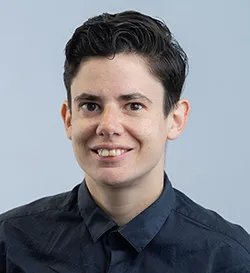
Dr Eleni-Alexandra Kontou is a Lecturer in Theoretical Physics. Eleni’s research interests lie in the field of quantum field theory on curved spacetimes.
What first attracted you to the field of mathematics?
I actually started loving astronomy from a very young age; one of my earliest memories is my mother talking about the motions of planets using apples and oranges!
Later I wanted to be a cosmologist, nothing seemed more important than learning about the universe as a whole. Then, as I started studying physics in college, I realised I am much more interested in theoretical work than doing experiments or observations. I was always good in mathematics, and I enjoyed solving problems, but I always saw mathematics as a tool to understand the universe. Maybe that’s why I still consider myself more of a physicist than a mathematician even though my work is very mathematically rigorous.
Tell us about something you are working on at the moment - what is exciting about it?
In our everyday life mass and energy are naturally positive and gravity is attractive. These properties of classical matter were exactly what allowed Roger Penrose to show the inevitability of singularities; points of infinite density at the centre of black holes. Meanwhile, quantum matter surprisingly allows for negative energy, a fact that has been measured in the lab.
However, this negative energy is not without restrictions. It has been shown that within quantum mechanics we can have a lot of negative energy for a short time, or a little for a long time.
But is this true for all quantum matter? This is still unknown and an interesting question that I have been exploring in my research. The answer would allow us to determine whether singularities are truly inevitable in a quantum universe and reveal insights into the nature of black holes.
What do you think is the biggest misconception people have about mathematics?
That mathematics is only for a few exceptionally smart people. I believe mathematics is a way of thinking and a language which nature speaks. The basic understanding of it is accessible to everyone, the same way other languages are. Sometimes in public talks I struggle to express a physical concept in words, when there's a simple explanation via an equation, but I know people will not be receptive to it.
What advice would you give to someone considering studying mathematics?
To do it! A degree in mathematics gives you a great background no matter what you want to do later in life. Mathematics has diverse applications in so many fields that the possibilities are endless.
Aside from mathematics, what do you do in your spare time?
I spend most of my free time with my wife and my one-year-old daughter, exploring London. In terms of hobbies, I really enjoy cycling and I recently started playing football with a local team. I also love reading, always grabbing a book on the tube or before bed.